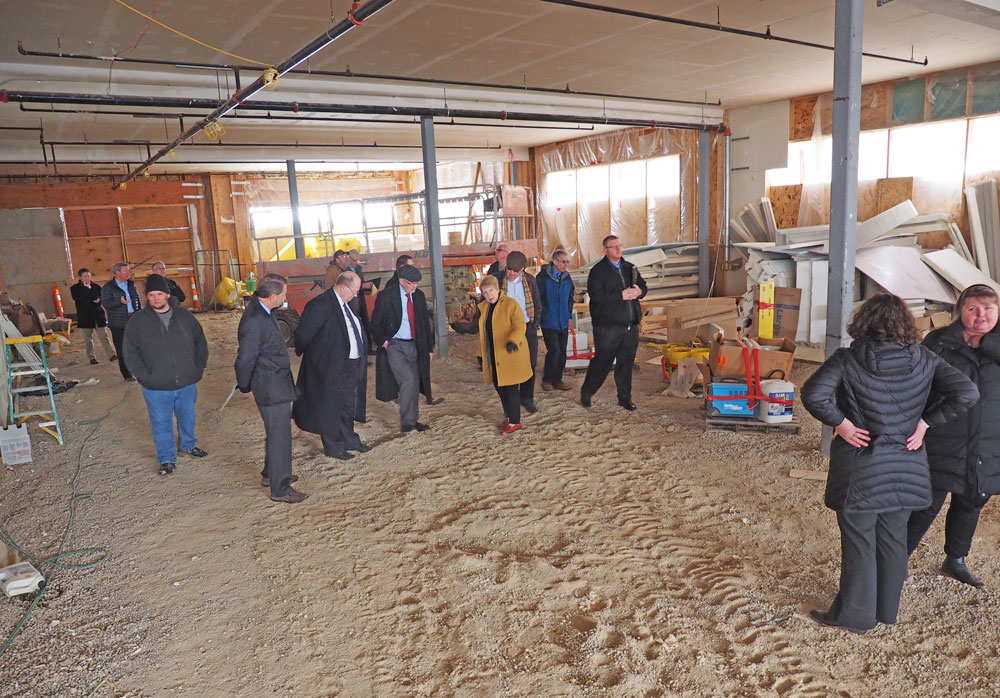Another McQuillen project court ruling expected Tuesday
By Bob Steenson, bsteenson@charlescitypress.com
A U.S. Bankruptcy Court judge said he will likely issue a ruling today (Tuesday) in the latest hearing regarding the McQuillen Place property in downtown Charles City.
Chief Judge Thad Collins acknowledged that regardless of how he rules, these are unlikely to be the final words on this issue that has been in various United States and Floyd County court proceedings for more than two years.
A hearing held Friday afternoon involved claims of copyright infringement and lack of due process regarding a previous order by the judge that allowed the sale of the McQuillen Place building and property on April 24 to Four Keys LLC, a company formed by the holding company that owns First Security Bank & Trust.
The Friday hearing, conducted by phone because of the coronavirus, involved potential clashes between federal bankruptcy law and federal copyright law, and Collins said the issue is likely going to be settled in federal district court regardless of his decision.
In fact, he indicated he might rule one way just to speed up the process of moving the case to U.S. district court through an appeal.
Collins said he would either have a short order today that the court needs to undo the sale of the property and further orders will follow, or he would deny the various motions in the case so that it could be appealed directly to the U.S. District Court for Northern Iowa.
Cornice & Rose International, a Chicago-area architecture and construction company that did the design work and organized much of the construction for McQuillan Place, had filed motions including asking the judge to reconsider his order allowing the sale of the McQuillen Place project, arguing there is no legal right to sell the property.
Attorney Louis Bonham, of Houston, Texas, representing Cornice & Rose, argued that Cornice & Rose holds the copyright to the design of the building, which extends to the building itself, and the license for use of the building was contingent upon the architect receiving “full complete and timely payment,” which did not happen.
“For that reason, there is no license for the construction of the building, and therefore the building is, indeed, an infringing copy of the architectural work,” Bonham said.
Judge Collins asked Bonham, “So you’re saying anytime there’s language in there … that says the license is only effective upon payment in full, anytime there’s that language and a building is built, the architect is not paid in full, it cannot be sold without the architects permission, period?”
“Correct,” Bonham said.
“OK, that’s news to me,” Collins said. “I’m going to have to take a look at that.”
Bonham said since 1990, when Congress passed the Architectural Works Copyright Protection Act, lenders on projects have been careful to include language in contracts that protects them and makes sure the license can be transferred.
“My understanding is that was not done in this case,” Bonham said.
Collins said, “That’s gonna require me to look into that, because I’m not gonna say I’m doubting what you say, I’m just saying I’ve never heard of that. It doesn’t seem like this is a result that would ever be intended.
“I’m just a little thrown for a loop,” Collins said. “I’ve done a lot of construction cases in my day, and I’ve never encountered anything like this.”
The judge asked if Bonham had examples of rulings where this question came up in bankruptcy cases, because bankruptcy law gives judges certain powers, for example to sell property free and clear even if there are mortgages or liens on it.
“Since 1990, when you say the law changed, I’ve got to believe there have been literally thousands and thousands if not tens of thousands of bankruptcy cases involving a property that was built-out where an architect wasn’t paid. And I just have trouble to believe that (no other court) has spoken on the issue, especially if it’s profound enough that it would just stop a bankruptcy sale in its tracks,” Collins said.
Bonham said he didn’t have citations handy that addressed specifically this situation.
Another motion Cornice & Rose had filed was to move the part of the case that deals with copyright issues out of the bankruptcy court into U.S. district court to decide.
Bonham said the fact that the judge is indicating this is a difficult issue with the intersection of Title 17 U.S. copyright law and Title 11 U.S. bankruptcy law, is exactly why the action to move the case up to district court exists.
The action is referred to as withdrawal of the reference in legal terms. Bankruptcy cases are technically under the original jurisdiction of U.S. district court, but in practice are automatically referred to the bankruptcy courts, so this action would be withdrawing that referral and keeping jurisdiction in district court.
Collins said he was familiar with the rules for withdrawal of the reference, but he would look into it further before making his ruling.
In another matter discussed at the hearing Friday, Charles Thomson argued on behalf of a motion filed by him and James Gray that the judge’s order to sell the property should be reconsidered because Thomson was not allowed to cross-examine the bankruptcy trustee in the case regarding the trustee’s actions in selling the property.
Thomson is a Charles City attorney who also practices in Chicago. He and other members of his family announced the McQuillen Place project in 2013 as a proposed combination residential and commercial/retail space on Main Street. Work on the project stopped in 2017 for a variety of reasons, resulting in an effort to foreclose on the property by First Security Bank, and filing bankruptcy by McQuillen Place Co. LLC.
Gray is the owner and president of Cornice & Rose, and he and Thomson are the equity security owners of McQuillen Place Co. LLC., which owned the McQuillen Place project.
Thomson said documents received during the discovery process make it clear there was an inadequate effort made to market the property by the appointed bankruptcy trustee, Cedar Falls attorney Chuck Smith.
Without an evidentiary hearing, the affidavit by Smith outlining the process he took in arranging the sale of the property and ultimately recommending that it be sold to First Security Bank & Trust in Charles City, amounts to hearsay, Thomson said.
“The only way it can become admissible and become part of a good record and sustain the sale order is if there is an opportunity for cross-examination,” Thomson said.
Responding to Thomson was Eric Lam, a Cedar Rapids attorney representing Four Keys LLC, which purchased the McQuillen Place property on April 24.
Lam said even if it was proved that Smith had done a terrible job in his role as trustee, the Iowa Economic Development Authority had also submitted an affidavit outlining the process it had gone through to help Smith market the property, including contacting a list of developers that had expressed interest in it and announcing the availability on various websites.
Judge Collins said he hadn’t been presented with any evidence of comparable properties in northeast or north central Iowa that had sold for more than the $1.1 million that Four Keys had paid.
It’s hard to argue that it wasn’t a good-faith purchase without evidence that it sold for less than it could have, Collins indicated.
Thomson said, “My point is we don’t have any evidence from the trustee without the ability to cross-examine.”
Collins said it might make sense to deny the motions to reconsider so his decision can be appealed more quickly than if he approved the motions and the sales process started over.
“Wouldn’t it be most expeditious instead of jumping through the other hoops just to, I just say, ‘Motions to reconsider denied,’ now you can go ahead and appeal all this up to district court?” he asked.
“If I’m wrong and the district court needs to straighten me out, that’s part of the pyramid here. They’re up above me and they tell me what to do.”
If the district court thinks it’s an urgent matter, then it can issue a stay on any further action taking place until a decision is made, he said.
“I’ll do my homework this weekend and on Monday, and we’ll see where it stands. I’ll try to get something out quickly so we can keep pressing this case forward,” Collins said Friday.












Social Share